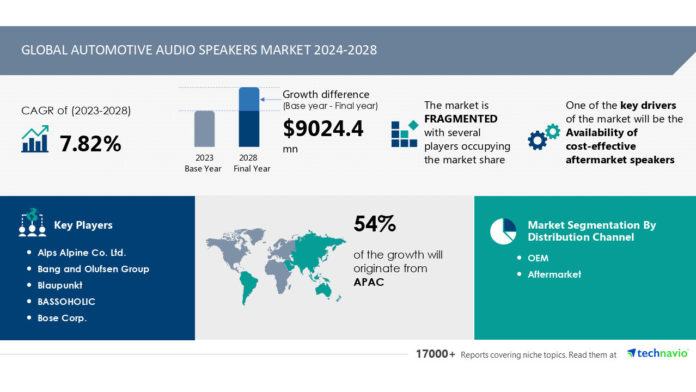
The global automotive audio speakers market size is estimated to grow by USD 9.02 billion from 2024-2028, according to Technavio. The market is estimated to grow at a CAGR of 7.82% during the forecast period. Availability of cost-effective aftermarket speakers is driving market growth, with a trend towards emergence of iot-enabled smart speakers. However, design complexities and high costs of advanced automotive audio systems poses a challenge. Key market players include Alps Alpine Co. Ltd., Bang and Olufsen Group, Blaupunkt, BASSOHOLIC, Bose Corp., Burmester Audiosysteme GmbH, Continental AG, DENSO Corp., Fender Musical Instruments Corp., Goertek Inc., JL Audio Inc., JVCKENWOOD Corp., Masimo Corp., McIntosh Group, Meridian Audio Ltd., Panasonic Holdings Corp., Pioneer Corp., Samsung Electronics Co. Ltd., Sony Group Corp., and VerVent Audio Group.
The Automotive Audio Speakers Market is experiencing significant growth due to increasing trends in safety features, voice-enabled audio, and enhanced in-car experiences. Speakers and sound amplifiers are key components of in-car audio systems in passenger cars, trucks, and luxury vehicles. The market is driven by factors like traffic congestion during daily work commutes, personal vehicles, and the desire for superior sound quality. Tweeters, mid-range cones, and radiating cone areas are essential for delivering clear bass and mid-range sounds. Automotive audio market players like Punch P1462, Alpine Electronics, and Alps Electric focus on producing high-quality materials and innovative designs. The commercial vehicle segment is also growing, driven by the need for onboard entertainment and improved driver comfort. Counterfeit products pose a challenge to the market, but vehicle production & sales, disposable incomes, and personal income continue to fuel demand. Hands-free calling, voice assistants like Siri and Cortana, and seamless music streaming via WiFi, Bluetooth, and 5G are transforming the market. Aftermarket infotainment systems and aftermarket sound systems are also gaining popularity, with Dolby technology and wireless technology enhancing the overall experience.
The new millennium has brought about substantial advancements in automotive entertainment systems, offering enhanced capabilities and faster processing power for customized in-vehicle experiences. To distinguish their offerings, automakers are partnering with technology companies to incorporate innovative features into various vehicle segments. Amazon’s Alexa, an intelligent voice assistant, is being integrated into several mainstream automotive infotainment systems through collaborations with BMW, Ford, Toyota/Lexus, and Audi. This integration of IoT-enabled smart speakers is set to fuel the expansion of the global automotive audio speakers market over the forecast period.
The automotive audio market faces challenges in delivering enhanced audio experiences in passenger cars, trucks, and luxury vehicles. Safety is a top priority, requiring speakers and sound amplifiers to be discreetly integrated without compromising sound quality. Voice-enabled audio, such as hands-free calling and voice assistants like Siri and Cortana, are increasingly popular. Traffic congestion during daily work commutes necessitates seamless music streaming via WiFi, 5G, Bluetooth, or wireless technology. Speaker components like tweeters, mid-range cones, and radiating cone areas must provide excellent bass and sound quality. Automakers strive to offer onboard entertainment systems with high volume speakers and advanced technology like Dolby. However, counterfeit products pose a threat to the market, affecting vehicle production & sales and consumer trust. The passenger car segment leads in-car entertainment systems, with aftermarket infotainment and sound systems offering customization options. The commercial vehicle sector also demands improved audio systems for driver comfort and productivity. The quality of material used in speakers and amplifiers, such as Alpine Electronics and Alps Electric, plays a crucial role in market growth. Personal disposable incomes and vehicle sales influence market trends.
Premium automotive audio speakers offer superior sound quality through advanced acoustics and tuning technology. These systems often feature 3D surround sound with a 5.1 channel configuration. However, the high costs of these advanced systems pose a challenge for Original Equipment Manufacturers (OEMs). They must either maintain low profit margins or pass additional costs onto consumers. In today’s competitive market, consumers seek maximum value for money, making it difficult for manufacturers to pass on these costs. As a result, providing affordable premium audio systems remains a significant challenge for the automotive industry.
The Original Equipment Manufacturer (OEM) segment of the automotive audio speakers market refers to the sale of speakers directly from the vehicle’s original producer. These OEM parts are guaranteed to be compatible with the specific vehicle model. OEMs sell their products primarily through branded auto dealers and directly to automakers. While the high cost of OEM parts may limit growth, advancements in technology, such as 3D printing, could revolutionize the OEM supply chain. This transformation is expected to drive significant expansion in the OEM segment of the global automotive audio speakers market during the forecast period.
The Automotive Audio Speakers Market is witnessing significant growth due to the increasing demand for advanced in-car audio systems in passenger vehicles. Safety features, such as hands-free controls and voice-enabled audio, are becoming essential in modern automobiles, driving market expansion. Automakers and audio system manufacturers are integrating high-quality speakers, sound amplifiers, tweeters, and other components to enhance the in-car audio experience. Traffic congestion and long commutes have fueled the popularity of onboard entertainment systems. However, the market faces challenges from counterfeit products and the impact of vehicle production & sales cycles on disposable incomes. Aftermarket sound systems continue to be popular, with Dolby technologies, 5G, WiFi, and Bluetooth connectivity adding value. High volume speakers are a key trend, offering improved sound quality and listening experiences.
The Automotive Audio Speakers Market is a significant segment of the in-car entertainment industry, focusing on speakers and sound amplifiers for passenger cars, trucks, luxury vehicles, and commercial vehicles. With the increasing demand for enhanced audio experiences, safety features, and onboard entertainment systems, the market is witnessing significant growth. Voice-enabled audio technology, such as Siri and Cortana, and hands-free calling are becoming increasingly popular, especially during daily work commutes and traffic congestion. Speakers come in various types, including tweeters, mid-range cones, and high volume speakers. The quality of material, radiating cone area, and punch factor (P1462) are essential factors in determining sound quality and bass. Flex fit baskets and other innovative designs ensure seamless integration into different vehicle models. Counterfeit products pose a challenge to the market, requiring strict regulations and quality control measures. The market’s growth is influenced by vehicle production and sales, disposable incomes, and personal income levels. WiFi, Bluetooth, 5G, and other wireless technologies are transforming the market, offering seamless music streaming and improved connectivity. Automakers continue to invest in advanced in-car entertainment systems, including aftermarket infotainment systems and aftermarket sound systems, such as those from Alpine Electronics and Alps Electric. Dolby technology and voice assistants further enhance the user experience.






